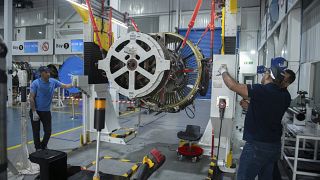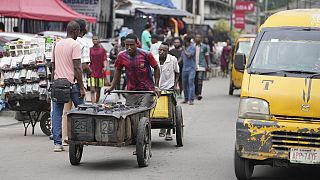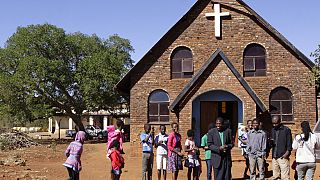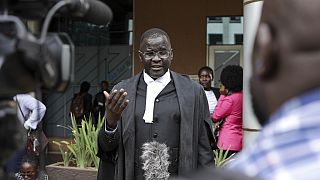Uganda
Ugandan's Kingfisher oil field is operated by China National Offshore Oil Corporation (CNOOC), as part of a joint deal with French oil giant TotalEnergies. Another oil field, Tilenga, is operated by TotalEnergies.
Kingfisher oilfield is expected to produce 40,000 barrels each day when production is at its peak, while Tilenga is expected to produce 190,000 barrels. Both form a key part of a major national project expected to be completed within two years.
Uganda is estimated to have recoverable oil reserves of at least 1.4 billion barrels. Drilling began in January this year (2023), the project is expected to be completed within two years.
Speaking on behalf of the Petroleum Authority of Uganda, corporate affairs manager Gloria Sebikari says the country is on track to begin producing oil by 2025.
She says $6.9 billion (USD) worth of contracts are being awarded, $1.8 billion (USD) of those will go to local companies.
“Two projects will produce the crude oil project that’s the Kingfisher project and the Tilenga project," she explains.
"Those two projects will produce oil and this produced oil will be commercialized through two other projects, the East African Crude Oil Pipeline, that will run from here, Hoima, to Tanzania to export crude oil, and then the Uganda refinery project, that will be used to process our crude oil into petroleum products for use.”
Sebikari says work on the 897-mile (1,443-kilometer) East African Crude Oil Pipeline (EACOP) is expected to begin this year.
It will be the world’s longest heated oil pipeline, transporting crude from fields near Lake Albert in western Uganda to Tanzania’s Indian Ocean port of Tanga.
The $2.5 billion dollar project provoked concern from groups who argue the pipeline poses serious risk to the environment.
Some oil wells are to be drilled within Uganda’s Murchison Falls National Park, where the Nile plummets 130 feet (40 meters) through a gap just 20 feet (6 meters) wide.
The surrounding wilderness is home to hippos, egrets, giraffes and antelopes.
The pipeline would then pass through seven forest reserves and two game parks, running alongside Lake Victoria, a source of freshwater for 40 million people.
That ecological fragility is one reason why some activists oppose the project despite assurances from TotalEnergies that the pipeline’s state-of-the-art-design will ensure safety for decades.
On Tuesday (26 June 2023) environmental groups brought another legal case against TotalEnergies in the French courts, the civil suit filed in Paris came four months after the collapse of a similar case brought by activists.
The new litigation cites TotalEnergies’ alleged failure to comply with France’s “duty of vigilance” law and seeks compensation for the company’s alleged violations of land and food rights over six years.
TotalEnergies has long denied the allegations.
A group of people were earmarked for compensation, either financial or housing, when TotalEnergies took over the Tilenga project.
Fifty-two-year-old Juliet Akumu got a house adjacent to the development area, but says she's now concerned about environmental pollution from the oil field.
She says a dust cloud recently covered her entire village.
“The major problem we have experienced so far was a couple of days ago, there was a huge dust that originated from the construction site and all of us were covered in that dust,” says Akumu.
Sebikari from Petroleum Authority of Uganda says they have addressed all loopholes and environmental concerns arising from the project.
“I believe a lot of the issues being raised by the activists are out of either misinformation or deliberate disinformation," she says.
"As government and the project partners, we have taken deliberate steps to ensure that the oil and gas projects are developed sustainably, we have taken care of the environment and biodiversity concerns.
"We are also ensuring that the livelihoods of the communities surrounding this operations are improved alongside the development of the projects.”
Waste management company EnviroServ is one of the companies licensed to handle the oil waste.
It’s facility manager, Peter Odil , says they have been meeting all regulatory requirements in its mandate to protect the environment from hazardous waste.
“We are compelled by the law to make sure that we monitor our activities here," he says.
"We have eleven monitoring wells in layman's term, you can call it the boreholes, they were drilled around this facility, and we pick the water samples from them, the deepest being 65 meters, the shallowest being 9, so we pick water samples all around this facility, we do analysis every three months and we report to regulators.”
Aside from environmental concerns, some say Uganda’s plans to tap oil from Lake Albert may cause tensions with the Democratic Republic of Congo due to their close border.
Felix Ocitti, manager of operations and compliance at Petroleum Authority of Uganda, says they've already put measures in place to resolve that.
“As far as we are aware right now, we do not have any claims from Congo in as far as this project is concerned, because there is no evidence right now that our resources actually cross the border," he says.
"If that happens, we have mechanisms through which we shall be able to develop our field and those three mechanisms I have mentioned are options that we have at the table.
"It is always at the discretion of the countries to negotiate and find what is best for us to be able to employ.”




![Can Africa’s soil sustain food security? [Business Africa]](https://static.euronews.com/articles/stories/08/39/08/36/320x180_cmsv2_6c750e33-e25d-57d1-a896-b069180361f4-8390836.jpg)








01:05
Niger signs deal to supply Mali with cheaper diesel
02:36
Luganda text-to-speech: breaking barriers and promoting accessibility for visualliy impaired
01:53
Uganda: Former sex worker helps others in Kampala slum
02:29
DRC: concern over the potential development of oil drilling
Go to video
Activists urge Nigeria to delay Shell's $2.4 billion sale of assets in deeply polluted Niger Delta
01:08
Kenya announces an end to G2G oil supply deal